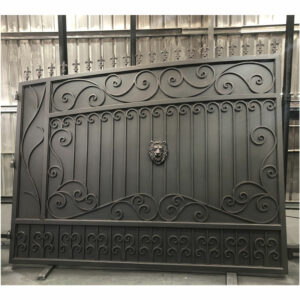In terms of strength, general iron doors generally outperform fiberglass doors. Here’s how they compare:
- Material Strength: Iron is inherently stronger than fiberglass. Iron doors are made of solid or hollow iron components, which provide robustness and structural integrity. Fiberglass doors, on the other hand, are composed of reinforced plastic fibers embedded in resin, which may not offer the same level of strength as iron.
- Resistance to Impact: Iron doors are highly resistant to impact and can withstand significant force without denting or cracking. This makes them suitable for high-traffic areas and provides enhanced security against forced entry. Fiberglass doors, while durable, may be more prone to denting or cracking upon impact.
- Security: Iron doors are often preferred for their superior security features. The strength of iron makes it difficult to break through, offering reliable protection against intrusion and burglary. Fiberglass doors may offer security features, but they may not be as strong and impenetrable as iron doors.
- Weather Resistance: Both iron and fiberglass doors offer good weather resistance, but iron doors may have an edge in harsh climates. Iron is naturally resistant to weathering, corrosion, and temperature fluctuations, making iron doors suitable for use in extreme weather conditions. Fiberglass doors are also weather-resistant but may degrade over time due to exposure to UV rays and moisture.
- Maintenance: Iron doors may require more maintenance compared to fiberglass doors. While both materials are relatively low-maintenance, iron doors may need periodic painting or sealing to prevent rust and corrosion. Fiberglass doors typically require less maintenance and can be easily cleaned with soap and water.
- Longevity: Iron doors are known for their longevity and can last for decades with proper care and maintenance. The durable nature of iron ensures that the door retains its strength and appearance over time. Fiberglass doors also have a long lifespan but may be more prone to wear and tear compared to iron doors.
Overall, while both iron and fiberglass doors offer durability and strength, iron doors generally have superior strength characteristics. They provide enhanced security, resistance to impact and weather, and longevity, making them a preferred choice for applications where strength and reliability are paramount, such as entry doors for homes, commercial buildings, and high-security facilities.
How do simple wrought iron gates contribute to the overall safety of buildings?
Simple wrought iron gates contribute to the overall safety of buildings in several ways:
- Access Control: Wrought iron gates provide a physical barrier that restricts access to the property, helping to prevent unauthorized entry by intruders, trespassers, or unwanted visitors. This enhances security and reduces the risk of theft, vandalism, and other criminal activities.
- Deterrence: The presence of wrought iron gates acts as a visual deterrent to potential intruders, signaling that the property is secured and protected. The perception of increased security can discourage criminals from attempting to breach the premises, thereby reducing the likelihood of security incidents.
- Boundary Definition: Wrought iron gates define the boundaries of the property clearly, demarcating where private property begins and ends. This helps prevent accidental trespassing and encroachment by pedestrians, vehicles, or animals, reducing the risk of property disputes or conflicts.
- Child and Pet Safety: Wrought iron gates can be installed to secure outdoor areas such as gardens, pools, or courtyards, providing a safe and enclosed space for children and pets to play without the risk of wandering off or accessing hazardous areas. This helps prevent accidents and injuries, promoting a safer environment for families and pets.
- Traffic Control: Wrought iron gates can be used to control vehicular and pedestrian traffic within the property, particularly in multi-unit residential complexes, gated communities, or commercial buildings. By regulating access and directing traffic flow, gates improve safety by reducing congestion, minimizing the risk of accidents, and maintaining orderly movement.
- Emergency Egress: While wrought iron gates provide security and access control, they can also be designed with emergency egress features to allow quick and safe evacuation in case of emergencies such as fires or natural disasters. Emergency exit gates equipped with panic hardware or quick-release mechanisms ensure that occupants can evacuate the building swiftly and safely when needed.
- Enhanced Privacy: Wrought iron gates provide privacy by screening the property from public view and limiting visibility into the premises. This helps protect the privacy and security of occupants by preventing unauthorized surveillance, trespassing, or intrusion by strangers.
- Integration with Security Systems: Wrought iron gates can be integrated with electronic security systems such as access control systems, intercoms, surveillance cameras, and alarms to enhance safety and monitoring capabilities. Automated gates controlled by keypads, remote controls, or mobile apps allow for convenient and secure access management.
Overall, simple wrought iron gates contribute to the overall safety of buildings by providing access control, deterrence, boundary definition, child and pet safety, traffic control, emergency egress, privacy, and integration with security systems. Their robust construction, visual presence, and functional features make them an effective security solution for residential, commercial, and institutional properties.
